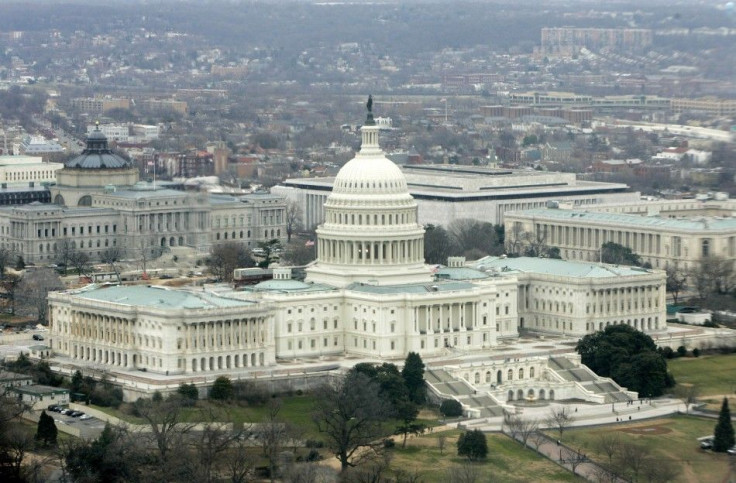Super Committee: Congressional Leaders Step in As Deadline Looms

On Tuesday, a dozen members of Congress walked into a room. Up for grabs were a mix of funding for government programs and tax considerations, with wide-ranging implications. The nation's fiscal future and how to reduce the budget deficit rested in the balance. Yet three hours later, they walked out with nary a peep about what was discussed.
The 12-member Joint Select Committee on Deficit Reduction, more commonly known as the super committee, held a public hearing Wednesday, after what has been two months of nearly-clandestine meetings offering little indication of progress. Things have reportedly become so uncertain, congressional leaders have intervened to hammer out a deal.
The super committee has less than a month left to scrap together $1.2 trillion in deficit reduction over the next decade. Coupled with the growing presence of lobbyists, as reported by POLITICO, and wide ideological gap split along party lines, some members of congress and the cacophonous pundit-ocracy have been left wondering if the committee will be able to meet its mandate by Nov. 23.
According to POLITICO, House Speaker John Boehner, R-Ohio, Senate Majority Leader Harry Reid, D-Nev., and Senate Minority Leader Mitch McConnell, R-Ky., (sans House Minority Leader Nancy Pelosi, D-Calif.), have intervened to help speed along an agreement. The trio reportedly met with super committee Co-Chairs U.S. Rep. Jeb Hensarling, R-Texas, and U.S. Sen. Patty Murray, D-Wash., Tuesday.
I'm not going to tell you who exactly I have been meeting with, Murray told POLITICO. But I will tell you I have been meeting with anybody who I believe will help us get to a deal at the end of the day.
The super committee was established as part of a deficit reduction deal, the Budget Control Act, in exchange for raising the nation's debt ceiling on Aug. 2. While the government was allowed to borrow up to $2.4 trillion more through 2013, the super committee was charged with reaching a bipartisan consensus on $1.2 trillion in deficit reduction over the next decade. Congress then has until Dec. 23 to pass the recommendations, otherwise trigger cuts, in the form of slashes to defense spending and Medicare benefits, would be automatically enacted.
Little Progress or Decent Progress?
According to various reports, Hensarling denied suspicions the discussions were progressing slowly at a Tuesday morning press conference.
I remain encouraged that the members of the joint select committee know how serious the situation is, he said. I believe they are all committed to achieving the goal, and before the stroke of midnight on Nov. 22, we still have plenty of time to do what we need to do.
The committee members have reportedly been bombarded with pressure from outside groups -- their colleagues, as well as lobbyists.
On Oct. 13, Pelosi released recommendations for the committee put together by 16 Democratic ranking committee members, which called for a balance of increased revenue and spending cuts.
The House Democratic Caucus is firmly committed to a deficit reduction plan that is big, bold, and balanced. Respected economists and other budget experts agree that a fair mixture of growth, savings, and revenues is needed, with everyone contributing their fair share, Pelosi wrote. Such a balanced approach presents the best chance for bipartisan support within the Congress. The American people overwhelmingly agree that significant revenues must be included in any plan and support a balanced approach.
Republican congressional members have also called for bold moves -- but without tax increases.
Tax increases, however, are not a viable option for the Joint Committee, Boehner said in a speech before the Economic Club of Washington D.C., posted on the National Journal. It's a very simple equation. Tax increases destroy jobs. And the Joint Committee is a jobs committee. Its mission is to reduce the deficit that is threatening job creation in our country.
The committee announced another public hearing for Nov. 1, with testimony from key players in previous deficit reduction efforts -- the Simpson/Bowles and Domenici-Rivlin Commissions. For now, the public hearings offer the best look at the super committee's trajectory.
The 12 are being very circumspect with their colleagues as well as the press... because a big deal is going to be a controversial deal, and there will be things in a big deal that all of its components, everybody will not like something, said House Minority Whip Steny Hoyer, D-Md., who does not sit on the committee. Nothing's agreed to until everything's agreed to, and they are trying to see what can be put on the table realistically to move forward on.
© Copyright IBTimes 2024. All rights reserved.





















